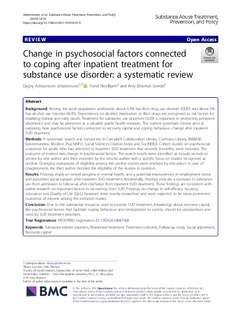| dc.contributor.author | Johannessen, Dagny Adriaenssen | |
| dc.contributor.author | Nordfjærn, Trond | |
| dc.contributor.author | Geirdal, Amy Østertun | |
| dc.date.accessioned | 2019-09-25T14:13:02Z | |
| dc.date.available | 2019-09-25T14:13:02Z | |
| dc.date.created | 2019-04-18T17:08:38Z | |
| dc.date.issued | 2019 | |
| dc.identifier.citation | Substance Abuse Treatment, Prevention, and Policy. 2019, 14 (16), 1-15. | nb_NO |
| dc.identifier.issn | 1747-597X | |
| dc.identifier.uri | http://hdl.handle.net/11250/2618809 | |
| dc.description.abstract | Background: Among the adult population worldwide, about 0.5% has illicit drug use disorder (DUD) and about 5% has alcohol use disorder (AUD). Dependency on alcohol, medication or illicit drugs are recognised as risk factors for disabling disease and early death. Treatment for substance use disorders (SUD) is important in promoting persistent abstinence and may be perceived as a valuable public health measure. The current systematic review aims at exploring how psychosocial factors connected to recovery capital and coping behaviour, change after inpatient SUD treatment. Methods: A systematic search was conducted in Campbell Collaboration Library, Cochrane Library, EMBASE, Epistemonikos, Medline, PsychINFO, Social Sciences Citation Index and SocINDEX. Cohort studies on psychosocial outcomes for adults who had attended to inpatient SUD treatment that exceeds 3 months, were included. The outcome of interest was change in psychosocial factors. The search results were identified as include, exclude or unclear by one author and then screened by the second author with a specific focus on studies recognised as unclear. Diverging evaluations of eligibility among the unclear studies were resolved by discussion. In case of disagreement, the third author decided the eligibility of the studies in question. Results: Findings imply an overall progress in mental health, and a potential improvement in employment status and perceived social support after inpatient SUD treatment. Additionally, findings indicate a decrease in substance use from admission to follow-up after discharge from inpatient SUD treatment. These findings are consistent with earlier research on important factors in recovering from SUD. Findings on change in self-efficacy, housing, education and Quality of Life (QoL) however, were scantly researched and were expected to be more prominent outcomes of interest among the included studies. Conclusion: Due to the substantial resources used to provide SUD treatment, knowledge about recovery capital, like psychosocial factors that facilitate coping behaviour and reintegration to society, should be standardised and used by SUD treatment providers | nb_NO |
| dc.language.iso | eng | nb_NO |
| dc.publisher | BMC (part of Springer Nature) | nb_NO |
| dc.rights | Navngivelse 4.0 Internasjonal | * |
| dc.rights.uri | http://creativecommons.org/licenses/by/4.0/deed.no | * |
| dc.title | Change in psychosocial factors connected to coping after inpatient treatment for substance use disorder: A systematic review | nb_NO |
| dc.type | Journal article | nb_NO |
| dc.type | Peer reviewed | nb_NO |
| dc.description.version | publishedVersion | nb_NO |
| dc.subject.nsi | VDP::Samfunnsvitenskap: 200 | nb_NO |
| dc.subject.nsi | VDP::Social sciences: 200 | nb_NO |
| dc.source.pagenumber | 1-15 | nb_NO |
| dc.source.volume | 14 | nb_NO |
| dc.source.journal | Substance Abuse Treatment, Prevention, and Policy | nb_NO |
| dc.source.issue | 16 | nb_NO |
| dc.identifier.doi | 10.1186/s13011-019-0210-9 | |
| dc.identifier.cristin | 1693168 | |
| dc.description.localcode | © The Author(s). 2019 Open Access This article is distributed under the terms of the Creative Commons Attribution 4.0 International License (http://creativecommons.org/licenses/by/4.0/) | nb_NO |
| cristin.unitcode | 194,67,40,0 | |
| cristin.unitname | Institutt for psykologi | |
| cristin.ispublished | true | |
| cristin.fulltext | original | |
| cristin.qualitycode | 1 | |

